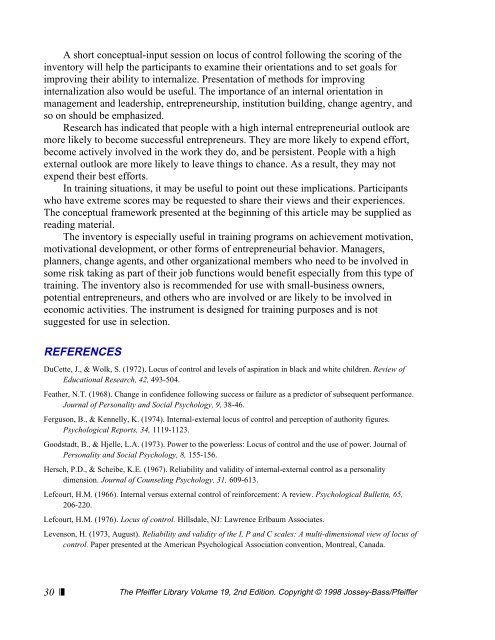motivational analysis of organizations
motivational analysis of organizations
motivational analysis of organizations
You also want an ePaper? Increase the reach of your titles
YUMPU automatically turns print PDFs into web optimized ePapers that Google loves.
A short conceptual-input session on locus <strong>of</strong> control following the scoring <strong>of</strong> the<br />
inventory will help the participants to examine their orientations and to set goals for<br />
improving their ability to internalize. Presentation <strong>of</strong> methods for improving<br />
internalization also would be useful. The importance <strong>of</strong> an internal orientation in<br />
management and leadership, entrepreneurship, institution building, change agentry, and<br />
so on should be emphasized.<br />
Research has indicated that people with a high internal entrepreneurial outlook are<br />
more likely to become successful entrepreneurs. They are more likely to expend effort,<br />
become actively involved in the work they do, and be persistent. People with a high<br />
external outlook are more likely to leave things to chance. As a result, they may not<br />
expend their best efforts.<br />
In training situations, it may be useful to point out these implications. Participants<br />
who have extreme scores may be requested to share their views and their experiences.<br />
The conceptual framework presented at the beginning <strong>of</strong> this article may be supplied as<br />
reading material.<br />
The inventory is especially useful in training programs on achievement motivation,<br />
<strong>motivational</strong> development, or other forms <strong>of</strong> entrepreneurial behavior. Managers,<br />
planners, change agents, and other organizational members who need to be involved in<br />
some risk taking as part <strong>of</strong> their job functions would benefit especially from this type <strong>of</strong><br />
training. The inventory also is recommended for use with small-business owners,<br />
potential entrepreneurs, and others who are involved or are likely to be involved in<br />
economic activities. The instrument is designed for training purposes and is not<br />
suggested for use in selection.<br />
REFERENCES<br />
DuCette, J., & Wolk, S. (1972). Locus <strong>of</strong> control and levels <strong>of</strong> aspiration in black and white children. Review <strong>of</strong><br />
Educational Research, 42, 493-504.<br />
Feather, N.T. (1968). Change in confidence following success or failure as a predictor <strong>of</strong> subsequent performance.<br />
Journal <strong>of</strong> Personality and Social Psychology, 9, 38-46.<br />
Ferguson, B., & Kennelly, K. (1974). Internal-external locus <strong>of</strong> control and perception <strong>of</strong> authority figures.<br />
Psychological Reports, 34, 1119-1123.<br />
Goodstadt, B., & Hjelle, L.A. (1973). Power to the powerless: Locus <strong>of</strong> control and the use <strong>of</strong> power. Journal <strong>of</strong><br />
Personality and Social Psychology, 8, 155-156.<br />
Hersch, P.D., & Scheibe, K.E. (1967). Reliability and validity <strong>of</strong> internal-external control as a personality<br />
dimension. Journal <strong>of</strong> Counseling Psychology, 31, 609-613.<br />
Lefcourt, H.M. (1966). Internal versus external control <strong>of</strong> reinforcement: A review. Psychological Bulletin, 65,<br />
206-220.<br />
Lefcourt, H.M. (1976). Locus <strong>of</strong> control. Hillsdale, NJ: Lawrence Erlbaum Associates.<br />
Levenson, H. (1973, August). Reliability and validity <strong>of</strong> the I, P and C scales: A multi-dimensional view <strong>of</strong> locus <strong>of</strong><br />
control. Paper presented at the American Psychological Association convention, Montreal, Canada.<br />
30 ❘❚<br />
The Pfeiffer Library Volume 19, 2nd Edition. Copyright © 1998 Jossey-Bass/Pfeiffer

















